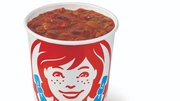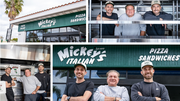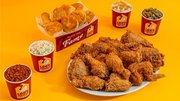Article
Taco Bell COO gives firsthand account of rising through the QSR ranks
What's it take to climb from the bottom of the corporate "food chain" at a large QSR to the C-suite? Determination? Luck? Support? According to Taco Bell COO Mike Grams, the answer is yes to all of those, along with having a deep respect for those you lead and the brand you serve.

February 20, 2019 by S.A. Whitehead — Food Editor, Net World Media Group
Taco Bell Area Coach Johanna Black said in her early days with the QSR — under the leadership of then-Training Manager Mike Grams — it was almost as if she had her own personal career coach and quasi-cheerleader. Mike Grams, now Taco Bell Global COO and general manager of North America, was the kind of leader who would call her at 8 p.m. on Fridays to make sure she was on track with her goals. It was as if he wanted her to win as badly as she did.
But that was just the beginning of his commitment to those he supervised. For instance, Black said the end-of-week phone "coaching sessions" were always supplemented by in-person visits when she said Grams' enthusiasm for her, other employees and the brand as a whole was infectious.
 |
| Taco Bell COO Mike Grams |
"When he arrived at my store and started rubbing his hands together really quickly, I knew he was up to something and I better get moving," Black said in an interview with QSRweb. "During that time, I was 0.1 percent away on results from being the Regional General Manager of the Year. So close! He'll never let me live that down. I couldn't have been in that position without him."
It's a story that is anecdotal of Grams' rise through the ranks at the quickly growing Mexican QSR, and his positivity and intense interest in his co-workers is obvious when you chat with him. He's not only charged up, but it can really be tough just to keep up with this executive as he rapidly relays all the positive things he seems to feel deep down about working at Taco Bell.
He said he was just drawn to the place by its energy when he first stepped into the job as an assistant general manager in the early 1990s when he was just 21. At that time, Grams will be the first to tell you that he was anything but a hard-driving, rise-through-the-ranks kind of guy. In fact, in an interview with QSRweb, he said in those days he was pretty much "without a plan to become anything particular in life."
Then — as Grams described it — he went to training with the company, then owned by PepsiCo, and everything changed. He said even in those early days of a very different corporate culture there was an energy to the place that burned brightly enough to light a bit of a fire in Grams that still seems to be burning bright.
"That's one thing that really attracted me to Taco Bell — the energy that the people had," he said. "The music was always playing and so it was kind of like this hip, young, growing brand that hadn't really hit its stride yet. And the people were just amazing!"
Almost quitting at the start
Those days, under PepsiCo, Grams was still working out of his Detroit hometown in the years before the Michigan city declared bankruptcy. Grams said the time and place were not only vastly different, but the people-oriented culture of Taco Bell as it is now under Yum Brands was far less central to its identity.
"To be honest, I just wasn't any good at it. ... I really struggled with the pace of the decision-making which was much quicker than I was used to. I wasn't good at things and my team members were. As a young man, that was really hard."
-Mike Grams speaking on his first job at Taco Bell
The intense focus on employees in those days was possibly part of the reason Grams nearly didn't make it beyond 6 months with the chain. He said though training was inspirational and uplifting, learning to manage daily life at a popular QSR location was much tougher than he'd expected. The learning curve was so steep that he almost quit a career that is now in its 28th year.
"To be honest, I just wasn't any good at it. ... I really struggled with the pace of the decision-making which was much quicker than I was used to," he said. "I wasn't good at things and my team members were. As a young man, that was really hard. I even remember coming home to my young wife and saying that I think I made a mistake."
Fortunately, at that low moment, two things happened. First, Gram's wife urged him to at least give it a year with the job. And the second thing? Well, that would be the fact that Grams listened and took her advice.
"Thank goodness she did that because a light bulb went off in those second six months about the fact that Taco Bell didn't hire me to be the fastest at making tacos or writing schedules, but they wanted me to be the best at leading people," he said. "Once I figured that out — that what I had to do was to make the people around me better and take care of them and do little things for them —then it all handles itself."
Grams said those experiences in the trenches have made all the difference in his work now as a leader at the chain, where he described each restaurant as a "little community." Today, he oversees some 7,000 of those "communities," along with being responsible for the pivotal job of ongoing franchisee relations.
"So, you know, from assistant manager who couldn't really tie his shoes or make tacos fast, to this — well there's a whole lot of 'between' in there, but that's it in a nutshell."
Making the franchisee connection starts from a seat in the 'back of the room'
Just as Grams attributed a lot of his success in the QSR field to those who worked with him at some of the most basic levels of the organization, he also credited his ability to get down "in the trenches" with franchisees and learn from them. In a chain that is 99 percent franchisee-owned, that kind of leadership connection can make a critical difference.
"I learned franchise relationships by sitting in the back of rooms when those franchisee meetings were going on and watching and listening to how that went down and what was important to them," Grams said."Those experiences were super-valuable and listening to what franchisees care about in the business and what's important to them is, too."
By way of example, he referred to his recent time spent on what he called "listening tours" where he visited franchisees' stores and listened to their thoughts about the brand and its leadership and strategies. But, the learning didn't stop there, rather he said it includes mentorships, which Grams finds keep him updated on employee priorities at a QSR that remains very much "young at heart."
"You can really learn through mentorships," he said. "You learn what the next thing coming is. This brand has been one of those that really plays to that 18- to 35-(year-old) demo. ... So once you get in this place you see it's constantly evolving and these kinds of opportunities to learn what's coming next are actually around you all the time if you stay aware of it. It's really cool because you can stay connected and feel really good and confident in how you're leading people, too."
When the culture 'eats change for breakfast'
In fact, that youthful mentality was key to one thing that Grams said sets Taco Bell's workforce apart. And that is a love for constant change, something that business management gurus often tend to steer leaders around as much as possible for the sake of their employees' job satisfaction.
"The No. 1 thing (employees) told me that attracted them to staying at Taco Bell was that 'it changes all the time. ... What they say they love about it — at anything from 30 years to three months with us — is that it changes. "
At Taco Bell, change is the very thing that employees expect and love about the brand.
"The No. 1 thing (employees) told me that attracted them to staying at Taco Bell was that 'it changes all the time.' ..." Grams said of his survey of the brand's workers. "What they say they love about it — at anything from 30 years to three months with us — is that it changes.
"So the commercials change every 30 days, and food offerings change every 30 days, and we're always talking about other things. I think that's really also how the world lives today and I think that's a cultural difference with Taco Bell that we should market more."
And maybe that's why some of the best career advice Mike Grams offered to leaders and other team members coming behind him was also about change. In fact, he encouraged those hoping to scale the employment heights at any QSR to look at their career paths as adventures instead of a series of steps or interruptions in an overall career-life plan.
"So, No. 1, I would tell them to be patient," he said. "It doesn't happen in a timeframe that you have expectations for, but you have to have reasonable expectations for growing your career. Also, every job you're in is an experience, so look at it like that ... and take on responsibilities that others don't want. Like, I moved five times for Taco Bell and ... every one of those experiences was different and added value. ...
"And when you think of your career, pick the coach you want to work for as much as the job itself because good coaches are the ones who can help you get to the other side of where you want to go."
Photos: Provided
About S.A. Whitehead
Pizza Marketplace and QSRweb editor Shelly Whitehead is a former newspaper and TV reporter with an affinity for telling stories about the people and innovative thinking behind great brands.
 ChatGPT
ChatGPT Grok
Grok Perplexity
Perplexity Claude
Claude








